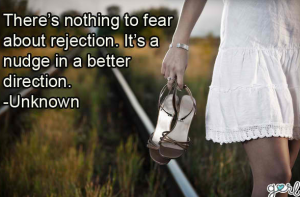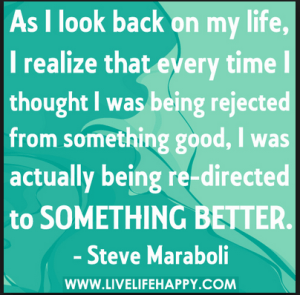“What do you mean you don’t want to be my friend? I’m adorable!”
No matter how you slice it, rejection in a career, a relationship or by a group, is painful. Some people seem to have the ability to let rejection slide off them fairly easily, while others find it impossible not to dwell on it. If you are a dweller, the emotional aftermath of rejection may look eerily like grief.
- Anger. You may want to lash out at the person (or persons) who hurt you. Before reacting, take a few days to calm down so you don’t do or say something you will regret. (Believe me, I know this is hard!)
- Sadness. You feel sad and sorry for yourself. Crying is cathartic. Talk to a trusted confidant. Journal through it. Take a walk. Engage in an activity that you derive confidence from and reminds you of your personal talents. Talk to others who have gone through similar rejection. There’s comfort in company.
- Ruminating. While processing rejection, you may start second-guessing and going over and over again in your mind what you did wrong or what you could have done to prevent the rejection. Nothing eats away at your spirit–and your sleep cycle–like chewing on a situation, spitting it back out to reexamine and then re-chewing some more. Realize that if you don’t let it go, your health will suffer along with your spirit. Are you really going to give the person who rejected you that much control over your life?
- Acceptance. After a few days of licking your wounds, remind yourself that usually we are rejected for reasons that are completely outside of our control.
What are some ways to move through rejection?
- Make a list of the traits that make you special.
- Hold onto kind notes from friends and family so that you can re-read them when you’re having one of those days.
- List the people you are grateful to have in your life. A strong support system is instrumental in how well you cope with rejection.
- Get together with a few of those friends and family members.
- Take heart in knowing that everyone experiences rejection at some time or another.
- Congratulate yourself for taking a risk even if it didn’t work out.
- Be open to the possibility that there really was nothing you could have done differently. And even if there was, forgive yourself. We all have off days now and then.
Although rejection can feel like a door slamming in your face, it actually has a funny way of opening new rabbit holes to pathways we may not have considered. In the end, we usually come out of the experience happier, more resilient, better adjusted and with a stronger sense of clarity about who and what works best in our lives.



Great post. I find I coach my children well on how to handle this but then struggle when it happens to me. Following your process can help us and allow us to model it for our kids.
Great post. Rejection is very hard to process…everything you wrote is so true!
Christa, well written! Overcoming rejection has a lot to do with building resiliency in general. Some people really have to work at developing these skills, while others seem to be able to adapt to new situations more readily. Thanks for sharing tips on how to do this!